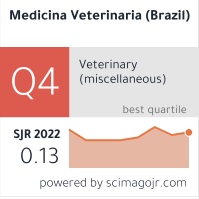Micropapillary Carcinoma in a dog: Case report
DOI:
https://doi.org/10.26605/medvet-v15n3-2704Palabras clave:
elastography, lymphadenectomy, mastectomy, oncologyResumen
Mammary neoplasms in female dogs present a high incidence. Several histological types are observed, among them, micropapillary carcinoma is considered one of the most aggressive because it is related to vascular invasion, metastases and low survival time. Aimed to describe a case of micropapillary breast carcinoma, with cutaneous metastasis, in a dog. A canine, female, 14 years old, 8kg, not defined breed, uncastrated, nulliparous, with pseudocyesis and no contraceptives administration history was attended at the Veterinary Reproduction and Obstetrics Service from "Governador Laudo Natel” Hospital, FCAV, UNESP, Jaboticabal, presenting a breast ulcerated nodule, with one month estimated evolution. After stabilization and preoperative exams, radical unilateral mastectomy and ipsilateral axillary and inguinal lymphadenectomy were performed. Histopathologic diagnosis revealed micropapillary carcinoma and free surgical margins from neoplasm, however, there were metastasis in both lymph nodes. The tutors did not adhere to antineoplastic chemotherapy. In 60th post-surgical day, there was inflammatory reaction in the surgical scar region, with small cutaneous ulceration, where the elastogram revealed rigidity and shear velocity of 7.84m/s. Skin biopsy revealed metastasis of micropapillary breast carcinoma. There was progression of ulcerations, compromising animal’s welfare and its physiological activities, when on the 110th post-surgical day, it was decided to euthanize the patient. The correct diagnosis and knowledge of tumor biological behavior are importants points to choose the correct treatment. The adjuvant chemotherapy treatment can impact on average survival time and ARFI elastography is an accurate predictor of rapid and non-invasive diagnosis of micropapillary carcinoma recurrence.Descargas
Citas
Cassali, G.D.; Lavalle, G.E.; De Nardi, A.B.; Ferreira, E.; Bertagnolli, A.C.; Lima, A.E.; Alessi, A.C.; Daleki, C.R.; Salgado, B.S.; Fernandes, C.G.; Sobral, R.A.; Amorim, R.L.; Gamba, C.O.; Damasceno, K.A.; Auler, P.A.; Magalhães, G.M.; Silva, J.O.; Raposo, J.B.; Ferreira, A.M.R.; Oliveira, L.O.; Malm, C.; Zuccari, D.A.P.C.; Tanaka, N.M.; Ribeiro, L.R.; Campos, L.C.; Souza, C.M.; Leite, J.S.; Soares, L.M.C; Cavalcanti, M.F.; Fonteles, Z.G.C; Schuch, I.D.; Paniago, J.; Oliveira, T.S.; Terra, E.M.; Castanheira, T.L.L.; Felix, A.O.C.; Carvalho, G.D.; Guim, T.N.; Garrido, E.; Fernandes, S.C.; Maia, F.C.L.; Dagli, M.L.Z.; Rocha, N.S.; Fukumasu, F.G.; Machado, J.P.; Silva, S.M.M.S.; Bezerril, J.E.; Frehse, M.S.; Almeida, E.C.P.; Campos, C.B.. Consensus of the diagnosis, prognosis and treatment of canine mammary tumors. Brazilian Journal of Veterinary Pathology, 4(2): p. 153-180, 2011.
Feliciano, M.A.R.; Silva, A.S.; Peixoto, R.V.R., Galera, P.D., Vicente, W.R.R. Estudo clínico, histopatológico e imunoistoquímico de neoplasias mamárias em cadelas. Arquivo Brasileiro de Medicina Veterinária e Zootecnia, 64(5): 1094-1100, 2012.
Feliciano, M.A.R.; Uscategui, R.A.R.; Maronezi, M.C.; Maciel, G.S.; Avante, M.L.; Senhorello, I.L.S.; Mucédola, T.; Gasser, B.; Carvalho, C.F.; Vicente, W.R.R. Accuracy of four ultrasonography techniques in predicting histopathological classification of canine mammary carcinomas. Veterinary Radiology & Ultrasound, 59 (4): p. 444-452, 2018.
Feliciano, M.A.R; Uscategui, R.A.R.; Maronezi, M.C.; Simões, A.P.R.; Silva, P.; Gasser, B.; Pavan, L.; Carvalho, C.F.; Canola, J.C.; Vicente, W.R.R. Ultrasonography methods for predicting malignancy in canine mammary tumors. PLoS ONE 12(5): e0178143, 2017.
Franzoni, M.S.; Rosa, V.A.; Silva, C.M.L.; Salvador, R.C.L; Amorim, R.L; Ferreira, T.M.M.R. Carcinoma mamário micropapilar metastático em cadela associado com sobrevida de 306 dias. Investigação, 16(1): 67-70, 2017.
Gamba, C.O.; Dias, E.J.; Ribeiro, L.G.R.; Campos, L.C; Lima, A.E.; Ferreira, E.; Cassali, G.D. Histopathological and immunohistochemical assessment of invasive micropapillary mammary carcinoma in dogs: A retrospective study. The Veterinary Journal, 196: 241–246, 2013.
Marchió, C.; Iravani, M.; Natrajan, R.; Lambros, M.B; Savage, K.; Tamber, N.; Fenick, K.; Mackay, A.; Senetta, R.; Di Palma, S.; Schmitt, F.C.; Bussolati, G; Ellis, I.O.; Ashworth, A.; Sapino, A.; Reis-Filho, J.S. Genomic and immunophenotypical characterization of pure micropapillary carcinomas of the mammary gland. Journal of Pathology, 215: 398–410, 2018.
Ricci P.; Maggini, E.; Mancuso, E.; Lodise, P.; Cantisani, V.; Catalano, C. Clinical application of mammary gland elastography: State of the art. European Journal of Radiology, 83(3): 429-437, 2014.
Salgado B. S.; Monteiro L. N.; Colodel M. M.; Figueiroa, F.C.; Soares, L.M.; Nonogaki, S.; Rocha, R.M.; Rocha, N.S. Clinical, cytologic, and histologic features of a mammary micropapillary carcinoma in a dog. Veterinary Clinical Pathology, 42(3): 382–385, 2013.
Tang, S.; Yang, J.; Du, Z.; Tan, Q.; Zhou, Y.; Zhang, D.; Lv, Q. Clinicopathologic study of invasive micropapillary carcinoma of the mammary gland. Oncotarget, 8(26): 42455-42465, 2017.
Descargas
Publicado
Cómo citar
Número
Sección
Licencia
Derechos de autor 2021 Medicina Veterinária (UFRPE)

Esta obra está bajo una licencia internacional Creative Commons Atribución-NoComercial-CompartirIgual 4.0.
- A Revista de Medicina Veterinária permite que o autor retenha os direitos de publicação sem restrições, utilizando para tal a licença Creative Commons CC BY-NC-SA 4.0.
- De acordo com os termos seguintes:
- Atribuição — Você deve dar o crédito apropriado, prover um link para a licença e indicar se mudanças foram feitas. Você deve fazê-lo em qualquer circunstância razoável, mas de nenhuma maneira que sugira que o licenciante apoia você ou o seu uso.
- NãoComercial — Você não pode usar o material para fins comerciais.
- CompartilhaIgual — Se você remixar, transformar, ou criar a partir do material, tem de distribuir as suas contribuições sob a mesma licença que o original.
- Sem restrições adicionais — Você não pode aplicar termos jurídicos ou medidas de caráter tecnológico que restrinjam legalmente outros de fazerem algo que a licença permita.









